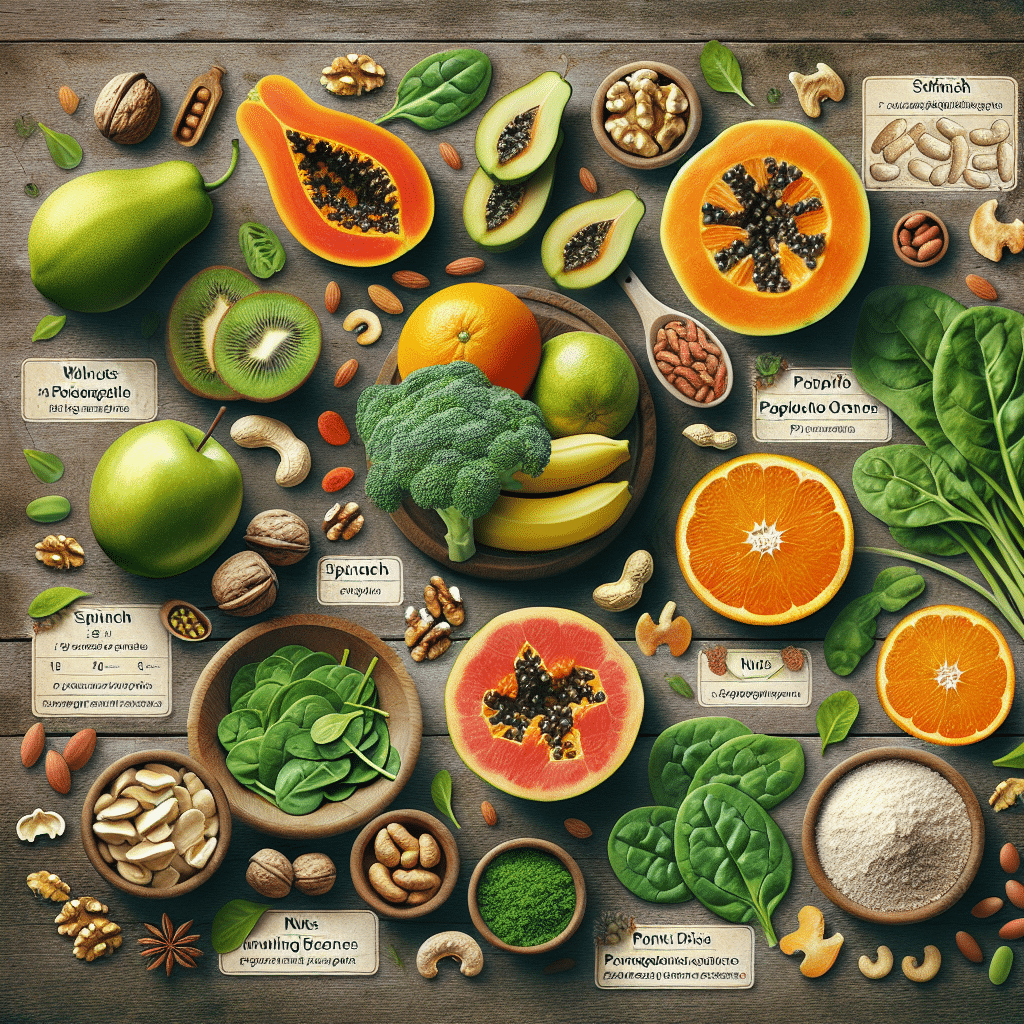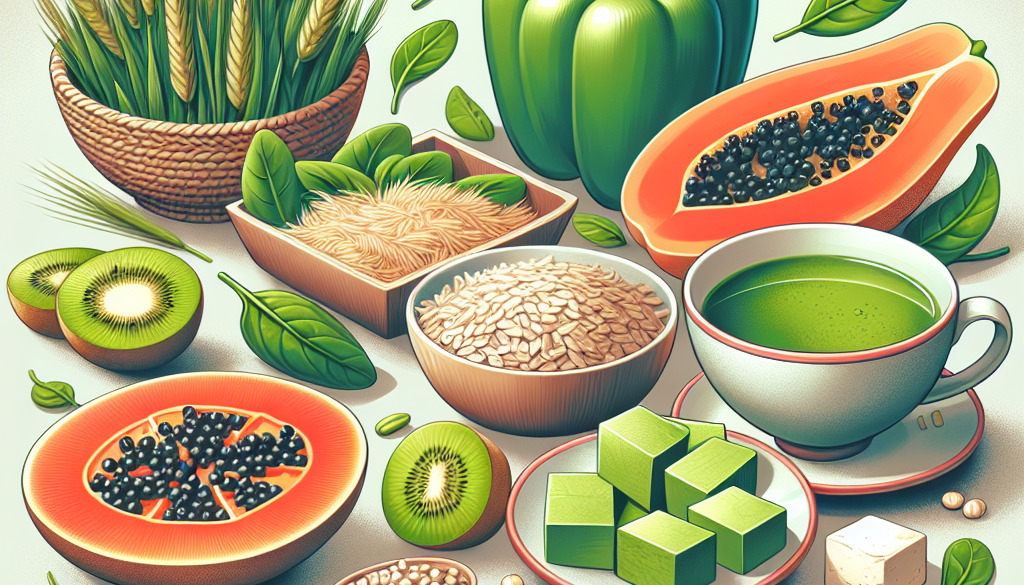PQQ Foods: Natural Sources
-
Table of Contents
PQQ Foods: Discovering Natural Sources of the Vital Nutrient

Pyroloquinoline quinone, commonly known as PQQ, is a micronutrient that has captured the attention of health enthusiasts and researchers alike. Its potential benefits range from enhancing mitochondrial function to supporting cognitive health. As interest in this compound grows, so does the curiosity about natural dietary sources of PQQ. In this article, we will delve into the foods that can help you incorporate PQQ into your diet naturally.
Understanding PQQ and Its Importance
Before we explore the natural sources of PQQ, it’s essential to understand what PQQ is and why it’s important for our health. PQQ is a bioactive compound with vitamin-like properties, although it is not currently classified as a vitamin. It plays a crucial role in cellular processes, particularly in the mitochondria, the powerhouse of the cell. PQQ has been shown to promote the growth of new mitochondria and improve energy metabolism. Additionally, it possesses antioxidant properties, protecting cells from oxidative damage.
Natural Sources of PQQ
While PQQ is not as ubiquitous as other nutrients, it can be found in a variety of foods. Here’s a list of natural sources where PQQ can be found:
- Fermented Soybeans (Natto): Natto, a traditional Japanese food made from fermented soybeans, is one of the richest sources of PQQ. Its unique fermentation process increases the bioavailability of PQQ.
- Green Tea: Green tea is not only known for its antioxidant properties but also as a natural source of PQQ. Regular consumption can contribute to your PQQ intake.
- Kiwi Fruit: This fuzzy fruit is not only rich in vitamin C but also contains PQQ. Adding kiwi to your diet can provide a sweet and nutritious way to consume PQQ.
- Papaya: Another tropical fruit that serves as a source of PQQ is papaya. It’s also packed with other essential vitamins and minerals.
- Spinach: Leafy greens like spinach are modest sources of PQQ. They are also rich in other nutrients, making them a healthy addition to any meal.
- Parsley: Often used as a garnish, parsley is more than just a decorative herb. It contains small amounts of PQQ as well.
- Field Mustard: Field mustard, or Brassica rapa, is another plant source of PQQ. It can be used in salads or as a cooked green.
While these foods contain PQQ, the amounts are relatively small compared to the concentrations found in supplements. However, incorporating a variety of these foods into your diet can help ensure you receive some level of PQQ naturally.
Benefits of PQQ-Rich Foods
Consuming foods rich in PQQ is not only about the PQQ itself but also about the synergy of nutrients these foods provide. Here are some benefits of including PQQ-rich foods in your diet:
- Enhanced Mitochondrial Function: PQQ’s role in mitochondrial biogenesis means that consuming PQQ-rich foods can help improve energy production in the body.
- Neuroprotective Effects: PQQ has been shown to support nerve growth factor and may protect neurons, potentially aiding in the prevention of cognitive decline.
- Antioxidant Properties: The antioxidant capacity of PQQ can help reduce oxidative stress, which is linked to various chronic diseases.
Case Studies and Research on PQQ
Research on PQQ has provided insights into its potential health benefits. For instance, a study published in the Journal of Nutritional Biochemistry found that PQQ supplementation resulted in improved cognitive function in middle-aged and elderly individuals. Another study in the journal Food Style highlighted the role of PQQ in enhancing sleep quality and reducing fatigue.
While these studies often focus on PQQ supplements, they underscore the importance of this nutrient and suggest that increasing dietary intake of PQQ through natural sources could be beneficial.
Conclusion: Integrating PQQ into Your Diet
In conclusion, PQQ is a nutrient with significant potential health benefits, particularly for mitochondrial health and cognitive function. While it is not as common as other nutrients, it can be found in a variety of foods, particularly fermented products, certain fruits, and green leafy vegetables. By incorporating these foods into your diet, you can naturally increase your PQQ intake and potentially reap the associated health benefits.
Enhance Your Health with ETChem’s Protein Products
If you’re looking to further support your health, consider exploring ETChem’s range of protein products. Their high-quality collagens, derived from various sources, can complement your dietary efforts to maintain a healthy and balanced lifestyle.
About ETChem:
ETChem, a reputable Chinese Collagen factory manufacturer and supplier, is renowned for producing, stocking, exporting, and delivering the highest quality collagens. They include marine collagen, fish collagen, bovine collagen, chicken collagen, type I collagen, type II collagen and type III collagen etc. Their offerings, characterized by a neutral taste, instant solubility attributes, cater to a diverse range of industries. They serve nutraceutical, pharmaceutical, cosmeceutical, veterinary, as well as food and beverage finished product distributors, traders, and manufacturers across Europe, USA, Canada, Australia, Thailand, Japan, Korea, Brazil, and Chile, among others.
ETChem specialization includes exporting and delivering tailor-made collagen powder and finished collagen nutritional supplements. Their extensive product range covers sectors like Food and Beverage, Sports Nutrition, Weight Management, Dietary Supplements, Health and Wellness Products, ensuring comprehensive solutions to meet all your protein needs.
As a trusted company by leading global food and beverage brands and Fortune 500 companies, ETChem reinforces China’s reputation in the global arena. For more information or to sample their products, please contact them and email karen(at)et-chem.com today.




